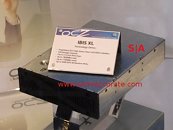Monday, March 7th 2011

OCZ Unveils IBIS XL 4 TB HSDL Solid State Drive
After dedicating a big chunk of its resources to the SSD market, OCZ's R&D became a fertile ground for new SSD solutions. The company put up its latest high performance, high capacity SSD for enterprises at CeBIT, the IBIS XL. This monstrosity supports OCZ's very own HSDL interface, and comes in the 5.25-inch form-factor (about the size of a PC optical drive). It offers a humongous 4 terabyte of storage, higher than even the highest PC hard drive in the market, which offers 3 TB. IBIS XL offers transfer rates of 1800 MB/s read, 1700 MB/s write, and up to 200,000 IOPS 4K random write performance.
Source:
SemiAccurate

32 Comments on OCZ Unveils IBIS XL 4 TB HSDL Solid State Drive
i'll buy a brand new car instead :D
I can see this disk being used by buisnesses that have to process petabytes of storage(Blizzar,google etc)
This SSD looks like a DVD drive with a vent instead of a tray. As this is a enterprise product, it will land in a server somewhere. Do enterprise servers have a lot of 5.25 bays?
What is the speed of DDR anyways? PC2100 or something? It's faster! Don't forget SSDs degrade over time when TRIM starts kicking in. Mine went from 620MB/s to 408MB/s in a week. =( DDR will stay fast forever! (as long as the backup batteries hold out)
Beast.
As for running all of TPUs content off this ... OCZ is known to put out beta products, and let the users do the testing. While charging them for fully functional product.
Don't know if I'd trust these for anything important.
www.thinq.co.uk/2011/3/7/ocz-shows-ibis-xl-4tb-solid-state-drive-demo/
If you all like this drive that much. Hold on to your butts.
ioDrive Octal: 5.12TB, 6GB/s read, 4GB/s write. Double-height PCIe 2.0 x16.
Don't send anything less than your all female personal army for it!
Kidding apart, one day they'll become affordable. One day...
If I moved over everything on my box now to the 2.56TB model, only have around 80GB of free space. That's not counting drives I have in other machines where I move overflow to.
The DDR1 @ 100MHz has a peak transfer rate of 1600MB/s
The DDR1 @ 133MHz has 2133MB/s
Imagine that average DDR3 has a transfer rate of ~13GB/s
So we are far before we are to close, hehe! :D